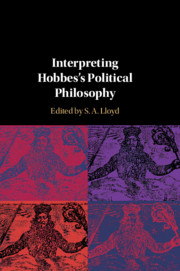Morality in the Philosophy of Thomas Hobbes
In this book, S. A. Lloyd offers a radically new interpretation of Hobbes’s laws of nature, revealing them to be not egoistic precepts of personal prudence but rather moral instructions for obtaining the common good. This account of Hobbes’s moral philosophy stands in contrast to both divine command and rational choice interpretations. Drawing from the core notion of reciprocity, Lloyd explains Hobbes’s system of “cases in the law of nature” and situates Hobbes’s moral philosophy in the broader context of his political philosophy and views on religion. Offering ingenious new arguments, Lloyd defends a reciprocity interpretation of the laws of nature through which humanity’s common good is secured.
- Of significant interest to political philosophers and political scientists as well as to moral philosophers and Hobbes scholars
- Contains an unusually detailed account of Hobbes' theory of education seldom discussed in other works on Hobbes
- It critically examines the major schools of interpretation of Hobbes' moral philosophy
Reviews & endorsements
"Sharon Lloyd's new book on Hobbes is one of the most significant in the last twenty-five years. She presents an original thesis about the foundation of Hobbes's moral philosophy.... Lloyd's book is required reading for all Hobbes scholars and political theorists."
--A. P. Martinich, University of Texas at Austin, Journal of the History of Philosophy
Product details
September 2009Adobe eBook Reader
9780511590641
0 pages
0kg
2 b/w illus.
This ISBN is for an eBook version which is distributed on our behalf by a third party.
Table of Contents
- Part I. Moral Philosophy, Method and Matter:
- 1. Moral judgments
- 2. Moral judges
- Part II. From Psychology to Moral Philosophy:
- 3. The law of nature: definition and function
- 4. A critical examination of derivations of the laws of nature
- 5. The reciprocity interpretation of Hobbes' moral philosophy
- Part III. From Moral Philosophy to Civil Philosophy:
- 6. Self-effacing natural law and the duty to submit to government
- 7. Fools, hypocrites, zealots, and dupes: civic character and social stability
- 8. The unity of practical wisdom.









